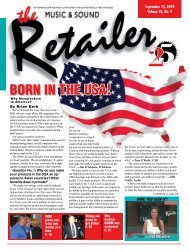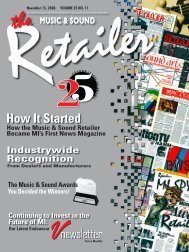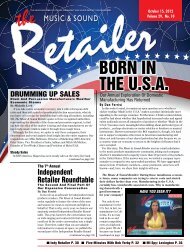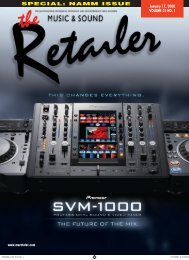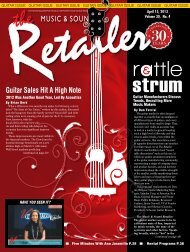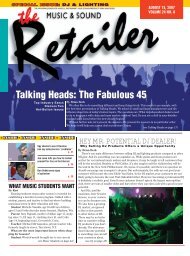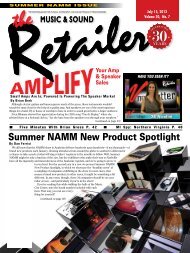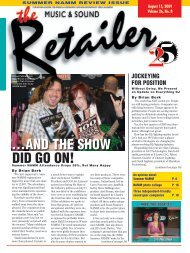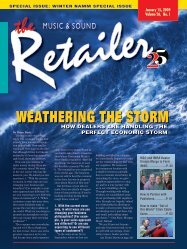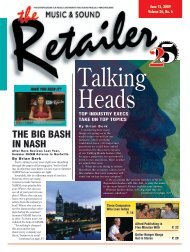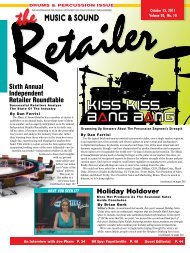laTeST - Music & Sound Retailer
laTeST - Music & Sound Retailer
laTeST - Music & Sound Retailer
You also want an ePaper? Increase the reach of your titles
YUMPU automatically turns print PDFs into web optimized ePapers that Google loves.
FIVE MINUTES WITH...<br />
Jason How Chairman, Rotosound<br />
By Brian Berk<br />
Rotosound is making a big<br />
push to have a greater influence<br />
in the United States. That is<br />
evidenced by not only its NAMM<br />
presence, but also its contest<br />
when the British-based company,<br />
officially founded in 1958, just<br />
sent two lucky dealers to visit its<br />
headquarters.<br />
Also visiting Rotosound’s factory<br />
in the British county of Kent<br />
was the <strong>Music</strong> & <strong>Sound</strong> <strong>Retailer</strong>.<br />
We visited the company’s factory<br />
and offices and enjoyed plenty<br />
of British food with Rotosound<br />
chairman Jason How and his wife,<br />
Kathy. Yes, we even consumed<br />
a few British libations. Our visit<br />
included an interview with How.<br />
Also joining us were his brother,<br />
Martyn (who happens to be<br />
a huge British NFL fan), and<br />
David Phillips, who runs A&R<br />
Marketing, which handles all of<br />
Rotosound’s public relations.<br />
How not only runs the business,<br />
but he also designs many of<br />
the machines his employees use.<br />
It’s safe to say we covered a lot<br />
of ground in the interview. Let’s<br />
begin.<br />
The <strong>Music</strong> & <strong>Sound</strong> <strong>Retailer</strong>:<br />
Please tell us about the<br />
history of Rotosound. How<br />
did it start? Can you tell us<br />
about your business?<br />
Jason How: The company<br />
started out when my father James<br />
inquired about making guitar<br />
strings in 1953. That’s the earliest<br />
documentation we have of the<br />
company. My dad was looking<br />
for materials because he went<br />
to see a film in 1951 called “The<br />
Third Man,” which was a spy<br />
thriller starring Orson Welles.<br />
There was zither music. A zither<br />
is an Austrian instrument so<br />
big it has 50 strings on it. It has<br />
what’s similar to a fretboard on a<br />
guitar. You make the chords with<br />
your left hand and pick with your<br />
thumb. The accompaniment is<br />
done with your forefingers. It’s<br />
quite tricky to play. When my<br />
father saw the movie and heard<br />
the music, he was captivated by<br />
it. He played the violin. After the<br />
movie, he made it a point to learn<br />
how to play a zither. He found<br />
an instrument, bought it and it<br />
probably had half the strings on<br />
it. He eventually decided to make<br />
strings for this instrument so he<br />
could learn how to play. Right at<br />
the start, my dad and his brother<br />
Ron were going to make instruments.<br />
My dad was an engineer.<br />
He figured he’d make instruments,<br />
make the strings for them,<br />
and he could make some money.<br />
That was in the mid-’50s. But my<br />
dad learned that making strings<br />
would be easier and perhaps<br />
more profitable than making<br />
instruments. So he bought a lot<br />
of zithers and fitted them up with<br />
strings. He started selling them.<br />
That’s how the business got<br />
started.<br />
M&SR: How and when did<br />
you get involved in the business?<br />
How: In the mid-’70s, I was<br />
being dragged out to the trade<br />
shows. Frankfurt in particular. I<br />
never really went to the American<br />
shows. I was about 18 or 19. I<br />
was always around the factory.<br />
I was close to the business<br />
from an early age. It’s a natural<br />
part of what you do. I didn’t get<br />
involved in a major way until<br />
the mid-’90s. I went to college<br />
for engineering and worked for<br />
a couple of other companies. I<br />
came back here in 1992.<br />
M&SR: So you wanted to<br />
experience some other jobs<br />
before ultimately committing<br />
to Rotosound?<br />
How: Yes. I just didn’t feel<br />
like I wanted to just work for<br />
Rotosound and that was it. I<br />
knew I could work for someone<br />
else. I just wanted to have the<br />
experience of working for an<br />
instrument maker. When I say<br />
instruments, I mean compasses<br />
that went to the army. I worked<br />
in instrument making for three<br />
years. I learned that business<br />
and came back in the early<br />
’90s. At that time, my dad was<br />
developing machinery. He said<br />
to me, “If you come back, you<br />
can help to finish building some<br />
of these machines.” He did all<br />
of the drawings. He said, “Here<br />
From left to right: David Phillips,<br />
Martyn How and Jason How.<br />
are the drawings. Make me 10 of<br />
those.” I would go into the workshop,<br />
make some bits and give<br />
them to my dad. He would tell me<br />
to make more bits. We needed<br />
better machines. The design<br />
he came up with in the mid-’80s<br />
was a brilliant design for string<br />
making. Subsequently, I have<br />
redesigned a lot of machinery<br />
and brought it up to date.<br />
M&SR: What do you make<br />
strings for?<br />
How: Seventy percent of our<br />
production is guitar strings.<br />
Electric and acoustic. Thirty<br />
percent is bass strings. Although,<br />
our company started out making<br />
violin, viola and cello strings. In<br />
the early ’60s, when all of the pop<br />
music became popular, my dad<br />
produced a string that changed<br />
the sound of the bass. That was<br />
the Round Wound bass string.<br />
Every company has now copied<br />
that. It was a pioneering sound<br />
used by The Who, Yes, Rush, The<br />
Police and many others. It gave<br />
bass guitars a unique tone. We<br />
were famous in America in the<br />
’60s because of our bass strings.<br />
30 April 2010



